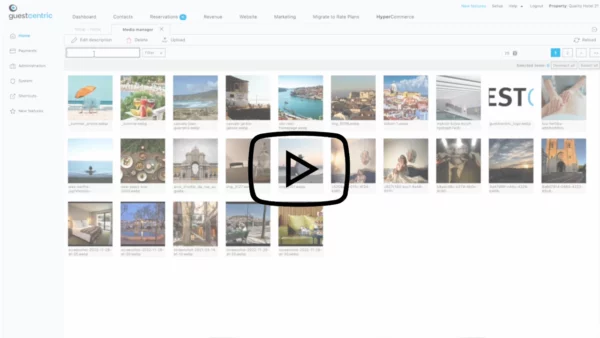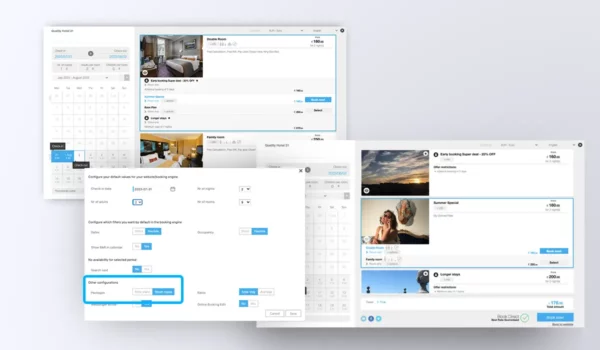Hotel Distribution 2024: Why Hotels Should Ride the GDS Wave
Reading Time: 6 minutesIn the intricate tapestry of the hospitality industry, Global Distribution Systems (GDS) have long been the favored tools of major players—hotel chains, airlines, and travel agents. However, as we stand on the cusp of 2024, the spotlight turns toward independent hotels and small groups. Should they venture into the realm of GDS as a pivotal element of their business strategy? Let’s unravel the potential and key considerations for these entities as they embark on the GDS Odyssey.
GDS – How the Corporate Booking Engine is becoming a Consumer Magnet
For years, GDS has operated as the unsung hero, orchestrating seamless corporate travel arrangements. Notably, major entities like American Express continue to wield GDS for booking hotels, flights, and more, cementing its role as the undisputed corporate booking dynamo.
While flights often adhere to corporate policies, the landscape is evolving for hotels. Travelers, particularly in the corporate sphere, crave unique experiences. The allure of boutique hotels can now be amplified through GDS, turning them into sought-after destinations for the discerning corporate traveler.
Beneath the surface, GDS holds strategic advantages. For hotels, it translates into wider market visibility, specifically targeting the coveted corporate segment. Guests, in turn, relish the convenience of having all travel arrangements taken care of on their behalf. Providers thrive in a symbiotic relationship through the revenue share model.
How the GDS is Growing and Morphing to Match Consumer Desires
Despite shifting travel trends, GDS stands resilient and continues to grow. At a recent conference in November 2024, panelists from Amadeus forecasted an annual growth of 1 to 2%.
Although corporate travel has been slower to resume following 2020, this arena is making a robust comeback, with a notable shift toward unmanaged travel—an area where GDS sees an opportunity for conversion into a managed environment. The heart of GDS strength lies in the Travel Management Company (TMC)-Hotel relationship. This partnership extends beyond bookings, ensuring complex problems are solved, namely as they relate to seamless transactions, cross-border commissions, and payments between multiple actors in the travel supply chain. It also opens up a colossal opportunity to drive GDS growth by converting unmanaged travel into a managed domain.
The Next Leap in GDS Growth
Global Distribution Systems are a legacy of the travel industry, and have been around for many years. Yet, these solutions are set to continue evolving in order to meet rapidly-evolving tech trends and consumer demands. Below are just 4 of the many trends set to shape GDS innovation in 2024 and beyond:
1. Adoption of Self-Booking Tools
Corporate travelers are increasingly embracing self-booking tools as a means to exercise greater control and autonomy in curating their hotel accommodations and travel experiences. This shift reflects a desire for personalized and tailored solutions that align with individual preferences and priorities. By utilizing self-booking tools, business travelers can efficiently browse through various hotel options, considering factors such as location, amenities, and pricing, to make informed decisions that cater to their specific needs.
This trend is crucial for hotels as it not only streamlines the booking process but also enhances customer satisfaction by empowering travelers to choose accommodations that align with their preferences and work requirements. The adoption of self-booking tools contributes to a more seamless and efficient travel experience, fostering a positive relationship between hotels and corporate clientele, ultimately leading to increased loyalty and repeat business. Hotels that prioritize providing a user-friendly and customizable booking experience stand to benefit from the evolving preferences of corporate travelers in today’s dynamic business landscape.
2. Air Travel in 2024 will Create Challenges & Opportunities for GDS Distribution
Looking ahead to 2024, the resurgence of air travel presents a unique set of opportunities and challenges for Global Distribution Systems. As air travel is set to surpass 2019 levels, GDS providers play a pivotal role in navigating this trajectory. GDS becomes the gateway for hotels to explore new segments, particularly in the realm of simple meetings.
However, amidst the positive projections, challenges like RFP spam and evolving sustainability expectations must be addressed. GDS providers need a strategic approach that positions them as catalysts for growth, ensuring they are ready to ride the wave of renewed air travel and its impact on distribution in 2024 and beyond.
3. Generative AI and Tailoring GDS for Personalized Experiences
The future unfolds with the acceleration of change, introducing us to the era of Generative AI. For Global Distribution Systems (GDS), this is likely to mark a pivotal shift towards crafting personalized experiences.
Amadeus, in collaboration with Microsoft and Accenture, is pioneering AI-powered integrations between its Cytric Easy travel and expense platform and Microsoft 365. The development includes a generative AI-powered chatbot, leveraging Microsoft technologies like GPT models from Azure Open AI Service, Microsoft 365, and Teams. This chatbot, embedded in Cytric Easy, aims to enhance the business travel booking experience by offering a dynamic, interactive, and conversational interface. The collaboration also involves a new plugin for Microsoft 365 Copilot, facilitating streamlined travel itinerary matching and booking within Microsoft 365.
The integration of generative AI solutions is part of a broader vision to transform business travel, providing hyper-personalized journeys while ensuring responsible global scalability. This initiative holds significant implications for hotels, as it highlights the growing trend of AI-driven, user-centric travel experiences, potentially impacting Global Distribution System (GDS) distribution and emphasizing the importance of hotels adapting to evolving corporate traveler preferences.
4. Sustainability will continue to Redefine GDS Impact on the Travel Landscape
Within the intricate fabric of the travel landscape, sustainability emerges as a decisive thread, profoundly influencing Global Distribution Systems. Many big corporates such as Siemens now have sustainability policies in place, and will not work with providers or partners who do not adhere to the criteria. Therefore, hotels that wish to compete on GDS must take this into consideration.
4 GDS Must-Dos for Independent Hotels and Small Groups
In 2024, hotels and groups will face a strategic imperative to maximize the potential of Global Distribution Systems (GDS). As the industry anticipates a resurgence in air travel and the widespread adoption of self-booking tools, hotels must adopt intelligent practices to navigate these shifts effectively.
Below are 4 best practices to make your hotel stand out in the GDS:
1. Partnering for Power: Strategic Alliances in the GDS Universe
For independent hotels and small groups aiming to thrive in the competitive hospitality landscape, strategic collaboration is essential. Embracing consortia and offering corporate negotiated rates, particularly for major corporations like Salesforce and Volkswagen, is crucial.
In various industries such as pharmaceuticals, finance, and technology, companies actively seek negotiated rates for their business travels. Independent hotels can stand out by providing these rates, positioning themselves as attractive options for corporate clientele. This approach not only boosts the hotels’ visibility but also establishes long-term relationships with business travelers, leading to increased bookings, revenue, and overall business success.
2. Personalized Perks: Tailoring GDS Strategies for Distinctive Stays
It’s imperative for independent hotels to underscore perks that resonate with the evolving preferences of business travelers. Essentials like in-room coffee machines, complimentary water bottles, room service available at specific times, and grab-and-go style food and beverage options are crucial. While business travel preferences may evolve, these essentials remain steadfast. Independent hotels should spotlight these amenities to cater to the changing needs of corporate travelers, emphasizing convenience and comfort. By prioritizing and showcasing these valued perks, hotels can attract and retain business travelers, ultimately enhancing their overall appeal and boosting customer satisfaction.
Harness the Potential of Personalization: Capitalize on the strength of personalization by customizing your GDS listings to showcase the distinctive features and experiences that make your hotel stand out in the crowd. Create engaging content that resonates with potential guests, aligning with their preferences for a more tailored experience.
3. Digital Dazzle: Crafting Intelligent GDS Strategies for 2024 and Beyond
To effectively resonate with corporate travelers, independent hotels must prioritize optimizing their digital experiences. It’s not merely about functionality; it’s about creating a delightful online presence. Start by thoroughly reviewing both static and dynamic content on your website to ensure it reflects the uniqueness and excellence of your hotel. Highlight key features and amenities that cater specifically to the needs and preferences of business travelers, such as efficient business centers, dedicated meeting spaces, high-speed Wi-Fi, and business-friendly services like early check-ins or late check-outs.
Consider incorporating visually appealing and user-friendly elements into your website design. This includes intuitive navigation, high-quality images of your facilities, and concise yet compelling descriptions that capture the essence of your hotel. Implement responsive design to ensure a seamless experience across various devices, acknowledging that corporate travelers often rely on smartphones and tablets for travel planning.
Furthermore, leverage technology to facilitate easy booking processes and provide transparent information about rates, policies, and any corporate discounts or perks available. A well-optimized website not only attracts corporate travelers seeking efficiency and convenience but also positions your hotel as a top choice for their business-related accommodation needs. By focusing on these aspects, independent hotels can ensure that their digital presence aligns seamlessly with the expectations and preferences of corporate travelers, enhancing the likelihood of attracting and retaining this valuable clientele.
4. Align GDS Strategies with Sustainability Expectations
Last but not least, hotels should implement sustainability policies and communicate them on the GDS. In an era where sustainability is a key consideration, ensure your GDS strategy aligns with eco-friendly practices. Highlight green initiatives and showcase your commitment to responsible hospitality, because large corporate companies will need to adhere to sustainability policies and won’t partner with hotels that do not follow the criteria.
Conclusion
In conclusion, the curtain rises on 2024, presenting a thrilling horizon for independent hotels and small groups to amplify their success by embracing the dynamic world of Global Distribution Systems. Navigate through trends, forge strategic bonds, and implement savvy practices to carve your niche in the ever-evolving tapestry of the hospitality industry. It’s time to unleash the power of GDS and embark on a transformative journey that defines the hospitality landscape in the years to come.

























